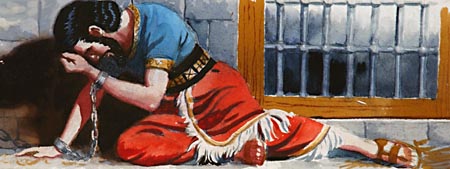Rock Bottom Knowledge
Greg Chandler
Trading the king’s throne for an enemy’s prison cell is anathema to any royal. The very idea of becoming slave to another clearly illustrates the loss of power, authority, and prestige and such was the lot of Judah’s wicked King Manasseh. This man of pedigree had great opportunity to know the ways of God; after all, his father Hezekiah had proven to be one of the southern kingdom’s most godly leaders. Though his father died when Manasseh was twelve, the advisors who surrounded the good king would surely have extended their wise counsel to his newly coronated son. Sadly, young Manasseh had other ideas. Despite his plunge into wickedness, this ungodly man had an unlikely rendezvous with God, resulting in a deeper knowledge of the One who controls all. His story is testimony that knowledge of God may be found in the most desperate situations.
The inspired chronicler had nothing good to say in introducing his readers to King Manasseh. After a brief factual introduction, he records, “And he (Manasseh) did what was evil in the sight of the Lord, according to the abominations of the nations whom the Lord drove out before the people of Israel” (II Chronicles 33:2). Proof of his wickedness is provided, with testimony illustrating an evil-bent to undo the good that his father had done and a devotion to pagan deities which led to atrociously offering his sons as burnt offerings. At the pinnacle of his wickedness, this deviant king had the audacity to erect an idol in the very temple of Jehovah; an act demonstrating how far Judah had plunged into wickedness that crossed a line which would ultimately lead them into captivity.
In stark relief to this wickedness, a testimonial to the patience and love of Jehovah is given. Providing even the vilest of kings opportunity to repent, the writer records that “the Lord spoke to Manasseh and to his people” (vs. 10a). Opportunity was given to repent, to return from wickedness, and to become the kind of king and nation God had long ago imagined. To a penitent nation, the Lord could once again say “You will be My People and I will be your God.” This wayward king could still become the kind of ruler described by Moses: “And when he sits on the throne of his kingdom, he shall write for himself in a book a copy of this law, approved by the Levitical priests. And it shall be with him, and he shall read in it all the days of his life, that he may learn to fear the Lord his God by keeping all the words of this law and these statues and doing them” (Deuteronomy 17:18-19). Both nation and king refused this gracious offer; though they knew God, they chose to disobey.
God’s love was still on the march. Punishing such crass disobedience, the Lord allowed Manasseh to be bound and taken to a foreign prison. As he sat in impoverished bondage, the formerly rich and powerful leader came to terms with Jehovah. The chronicler records, “Then Manasseh knew that the Lord was God.” While he certainly had knowledge of God prior to these events, “hitting bottom” opened his eyes to a richer understanding of what God had offered and what God had now taken away. In his poverty and imprisonment, he now appreciated the spiritual riches and freedom found in a right relationship with God. In His love, God had allowed yet another opportunity for the king to come to his spiritual senses; in his humility, Manasseh accepted the offer of his gracious God. Freed from his bonds, he returned to Jerusalem with fiery zeal to rectify the wrongs for which he was responsible: idols were destroyed, true worship was restored, and the people were ordered to follow only Jehovah. Manasseh desired for them to know God as he now knew Him.
The account of this ancient king provides important lessons for those of the modern era. He illustrates that, while one can have knowledge of God, this is of little value until one puts this knowledge into real action. Speaking through His word, God invites His creation to join in fellowship with Him; He desires that evil be set aside and that all become a part of His holy nation. As recorded by the psalmist, He invites all to “taste and see that the Lord is good” (34:8).
While some willingly accept the Lord’s invitation, others stubbornly refuse in the same manner as King Manasseh. In such situations, the Lord does not give up; as with the wayward leader, He sometimes allows obstinate modern men and women to hit “rock bottom,” hoping the jolt will bring them to their spiritual senses. This is the Lord’s discipline; this is His fatherly love which longs for reconciliation with a lost child (Hebrews 12:5-6). In these situations, it is important to learn His lesson and, as King Manasseh, entreat the Lord. This requires emptying the heart of pride and understanding the necessity of following after God. It means coming to terms with the downward spiral of wickedness and realizing true happiness is found only in the loving Father. It requires coming to know God.
The account of King Manasseh is a challenge to everyone; it is a call to fully evaluate whether or not one knows God in the fullest sense of the term. Surface knowledge will not suffice; a simple admittance that there is a God is a far cry from intimately knowing Him through both His divine attributes and His holy word. It is only when His power is recognized, when His love is praised, when His salvation is accepted, and when His will is ensconced that one will rise to do His bidding and, like Manasseh, seek to undo the harm done while in the wrong. Surely if God could love a man who polluted His temple, He can love any man or woman, no matter the spiritual road they have taken. May everyone come to know God deeply; may all “taste and see that the Lord is good.”

